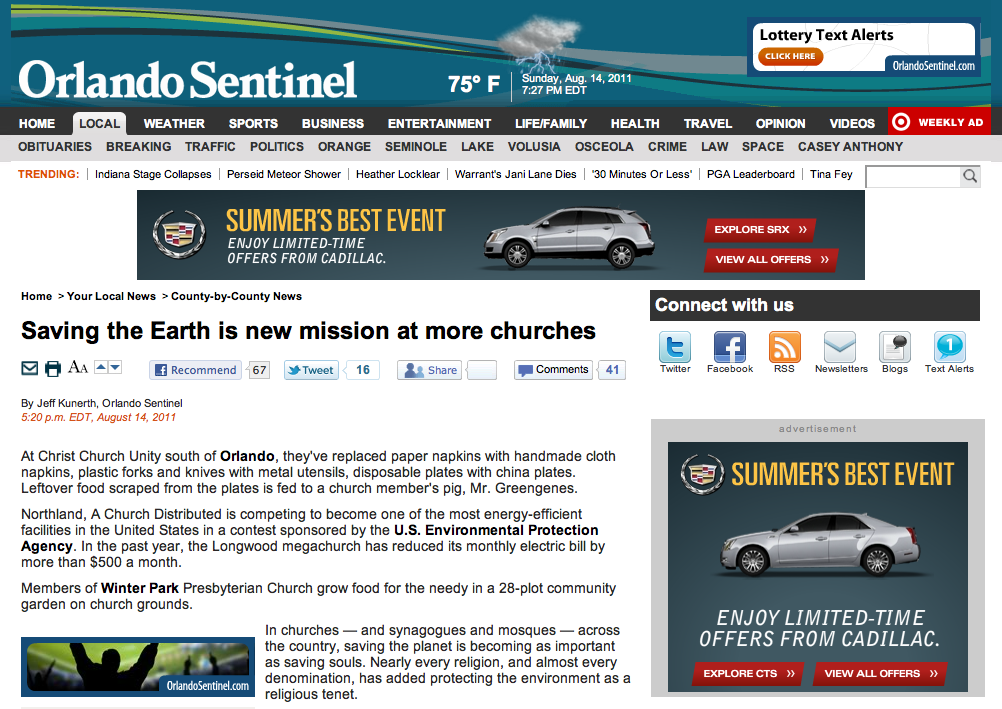Saving the Earth Is New Mission at More Churches
At Christ Church Unity south of Orlando, they've replaced paper napkins with handmade cloth napkins, plastic forks and knives with metal utensils, disposable plates with china plates.
Leftover food scraped from the plates is fed to a church member's pig, Mr. Greengenes.
Northland, A Church Distributed is competing to become one of the most energy-efficient facilities in the United States in a contest sponsored by the U.S. Environmental Protection Agency. In the past year, the Longwood megachurch has reduced its monthly electric bill by more than $500 a month.
Members of Winter Park Presbyterian Church grow food for the needy in a 28-plot community garden on church grounds.
In churches — and synagogues and mosques — across the country, saving the planet is becoming as important as saving souls. Nearly every religion, and almost every denomination, has added protecting the environment as a religious tenet.
"We've seen this explosion of activity at the individual and congregational level that is really a sign that this is firmly centered in terms of who we are as a religious people," said Matthew Anderson-Stembridge, executive director of National Religious Partnership for the Environment, a coalition of Jewish and Christian denominations formed in the early 1990s.
The greening of the church comes at the same time that concern for the environment is becoming a part of the cultural mainstream. Driving hybrid cars, unplugging household appliances, replacing disposable plastic water bottles with reusable metal ones, andseparating household trash into recyclables and garbage are no longer the intellectual property of hippies, tree huggers and communes.
"The surprising thing for me is there seems to be some consensus. We are seeing very conservative Protestant denominations embracing Earth care, and you are seeing some mainline, more-liberal denominations," said Darby Ray, associate professor of religious studies at Millsaps College in Jackson, Miss.
In many ways, the change in the culture has produced a change in theology — a rethinking and reinterpretation of Scripture from a belief that God intended mankind to exploit the Earth for its own benefit to mankind's obligation to protect and preserve the Earth that God created. Much of the push for going green has come from the people in the pews rather than the people behind the pulpit, said Gerald Smith, religion professor at Sewanee: TheUniversity of the South in Sewanee, Tenn.
"I think it's congregation-driven rather than leadership-driven. This is what people are bringing to the church," Smith said.
But it also has come from church leaders, such as Northland pastor Joel Hunter, who was an early convert among influential evangelists in advocating saving the Earth.
"The moral issues of our times, including environmental care, are a part of the practice of our faith and thus very important," Hunter said, but added that nothing surpasses the importance of saving souls.
At Northland, employees put into practice what Hunter peaches. Each department looks for ways to recycle, reduce and reuse.
Printer paper is reused three times before it ends up in the recycling bin. Lights and air conditioning are turned off in the balcony of the church for services that are less than capacity, and the whole building is closed on Fridays. The children's ministry has a team that sorts through the trash cans to separate the recyclable paper, plastic and glass from the garbage. The information-technology department refurbishes and recycles old computers and other electronics.
Northland is following in the footsteps of another megachurch, First Baptist Orlando, which has won Energy Star recognition from the EPA for its reduced electricity use and recycling.
Though Northland's "creation care team" is comprised primarily of church employees, Christ Church Unity's "green team" is made up of members of the congregation. Based on green-team recommendations, the church uses a custom-made, 100-gallon rain barrel to water the church grounds, recycles Sunday programs, sells metal water bottles in the church bookstore to replace plastic bottles, and reminds everyone leaving a church restroom to turn off the lights.
Because of its efforts, the congregation was recognized as the first Unity church in the United States to be designated as certifiably "green."
"It's more than a buzzword or a popular trend with us. It shows up in everything we do," said Kathy Beasley, director of pastoral care.
Since March, Orange County has been contacting religious organizations on how they can save the planet and money at the same time.
"Our goal is to encourage the faith-based organizations to simply reduce their utility bills by 30 percent and then get into recycling and reusing," said Chris Kuebler, the county's faith-based community-outreach coordinator.
One of the churches Kuebler contacted was Winter Park Presbyterian. Senior pastor Lawrence Cuthill said his church is looking at installing solar panels to save energy. But the biggest step the church has taken is a community garden, which represents the growing spiritual commitment among many faith-based organizations to cultivate the Earth instead of just taking whatever resources it has to offer.
"We are part of that movement that says we need to be good stewards of the Earth," Cuthill said. "Our calling is not to exploit the garden, but to keep the garden."
by Jeff Kunerth, jkunerth@tribune.com or 407-420-5392
FIND THIS ARTICLE AT: http://www.orlandosentinel.com/news/local/os-save-the-earth-at-church-20110813,0,3410208.story


